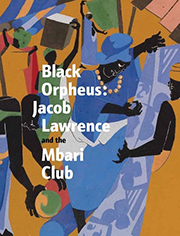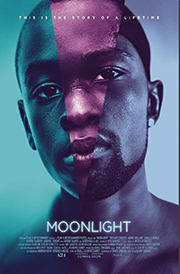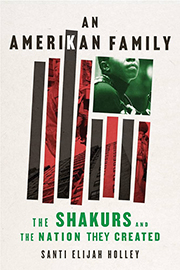Since 1976, the U.S. government has officially observed February as Black History Month, with the Association for the Study of African American Life and History designating a theme each year. The theme for Black History Month 2024 is “African Americans and the Arts,” and UVA librarians are excited to offer recommendations for books, films, and even datasets that examine Black culture, history, and creativity. This year’s recommendations come from Reference Librarian Mandy Rizki and, where noted, from Keith Weimer, Librarian for History and Religious Studies. For more recommendations, also see our posts commemorating Black History Month 2023, Black History Month 2022 and Black History Month 2021.
 “Black Orpheus: Jacob Lawrence and the Mbari Club,” edited by Kimberli Gant and Ndubuisi Ezeluomba (2022)
“Black Orpheus: Jacob Lawrence and the Mbari Club,” edited by Kimberli Gant and Ndubuisi Ezeluomba (2022)
I was first introduced to Jacob Lawrence when I lived in Washington, D.C., and was lucky to be able to visit half of his “The Migration Series” at the Phillips Collection often. The other half lives at the Museum of Modern Art in New York. This book, “Black Orpheus,” explores the relationships between Lawrence and the members of the Mbari Artists & Writers Club through artwork, of course, but also through archival materials, essays, photographs, and images of the Mbari Club’s arts magazine, Black Orpheus (1957-67). Inspired by Lawrence’s lesser-known “Nigeria” series from the 1960s, this gorgeous exhibition catalog explores the huge, yet often ignored, impact of African Modernism on Lawrence’s practice and on art history globally.
Available in print.
 “Moonlight,” by Barry Jenkins (2016)
“Moonlight,” by Barry Jenkins (2016)
You may remember this 2016 film for winning Best Picture and Best Supporting Actor — to Mahershala Ali — at the Oscars. Nearly eight years away from the revelation of its release and the buzz of awards season, the movie has aged to an even more beautiful, moving, thoughtful experience. Queer identity is easier to find in media now than ever before, but to explore queer sexuality is still so rare, even more so Black queer sexuality. “Moonlight,” available on SWANK Streaming Film Database, does just that, in luminous color and amazing performances through all three chapters of the film.
Available on SWANK Streaming Film Database.
 “Beyond the Door of No Return,” by David Diop, trans. Sam Taylor (2023)
“Beyond the Door of No Return,” by David Diop, trans. Sam Taylor (2023)
Set mostly in the 1750s in Senegal, this 2023 novel by David Diop (translated by Sam Taylor) layers language, time, relationships, truth, and imagination. The main character, Michel Adanson, was really a botanist who worked in Senegal in the 18th century. Diop, himself French-Senegalese, has taken Adanson as a starting point to imagine a story about his experiences traveling through the heart of the transatlantic slave trade, including descriptions of the House of Slaves and its Door of No Return on Gorée, off the coast of Dakar. You may recognize this historic location from other novels, including those by Kwame Alexander and Yaa Gyasi. Diop’s epistolary book, translated from French, completely engages us in the lives of Adanson and his daughter, Aglaé, with skillful writing. Its vivid descriptions and astute observations move what may have been a trite novel into a mesmerizing work.
Available in print.
 “The History of Black Studies,” by Abdul Alkalimat (2021)
“The History of Black Studies,” by Abdul Alkalimat (2021)
Alkalimat, a professor of African American Studies and of Library and Information Science, has worked in the field of Black Studies since its founding in the 1960s. This chronicle, therefore, is based in both historic research and first-hand experience. Alkalimat describes how Black Studies departments were born out of political movements from student activism to Black Power, and doesn’t underplay the impact of the women’s movement and co-ed activism on the creation of these departments and programs. Simultaneously, Alkalimat reminds us that Black intellectualism existed long before the institutionalization of Black Studies. Check out his subsequent book too, The Future of Black Studies.
Available in ebook.
 “An Amerikan Family: The Shakurs and the Nation They Created,” by Santi Elijah Holley (2023)
“An Amerikan Family: The Shakurs and the Nation They Created,” by Santi Elijah Holley (2023)
This 2023 publication reviews the history of the Shakur clan and their commitment to Black resistance movements from Marcus Garvey’s Universal Negro Improvement Association in the early 20th century, the Nation of Islam, the Black Panthers and its offshoots — including the violent Black Liberation Army — and the cultural activism of rapper Tupac Shakur. Patriarch Salahdeen Shakur ties the various figures and movements together, though much attention is paid to his daughters-in-law Afeni Shakur (Tupac’s mother) and Assata Shakur (still a fugitive in Cuba). The book offered a clear overview of important currents of thought, organizations, and personalities within the Black community, as well as the connections between them.
Available in print. (This recommendation was provided by Keith Weimer)
National Survey of Black Americans Series, by James S. Jackson, Harold W. Neighbors, M. Belinda Tucker, and Gerald Gurin
Novels, books, and films are crucial to understanding and celebrating Black history and culture — so is data! Many institutions and research centers create datasets studying Black communities, health, experiences, and much more. This particular dataset from the University of Michigan’s Institute for Social Research, spanning 1979 to 1992, is focused on social, economic, and psychological data of Black Americans. Other publicly available datasets on Black American life can be found via Pew Research, the US Census Bureau, and more. Our Research Data Services team is here to help you work with data and find datasets. Attend a workshop to dive deep on software or visit the StatLab by appointment or walk-in hours.
Available from the Institute for Social Research at the University of Michigan.
